
The Arctiinae are a large and diverse subfamily of moths, with around 11,000 species found all over the world, including 6,000 neotropical species. This group includes the groups commonly known as tiger moths, which usually have bright colours, footmen, which are usually much drabber, lichen moths, and wasp moths. Many species have "hairy" caterpillars that are popularly known as woolly bears or woolly worms. The scientific name of this subfamily refers to this hairiness. Some species within the Arctiinae have the word tussock in their common name due to people misidentifying them as members of the Lymantriinae based on the characteristics of the larvae.
This page is a list of lists of some of the 160,000 species of Lepidoptera that are commonly known as moths.
Woolly bear may refer to:

The Spilosomina are a subtribe of tiger moths in the tribe Arctiini, which is part of the family Erebidae.
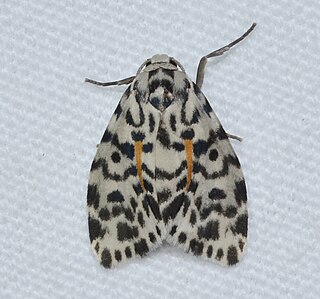
Clemensia is a genus of moths in the family Erebidae. The genus was described by Packard in 1864.

Crambidia is a genus of moths in the family Erebidae. The genus was described by Packard in 1864.
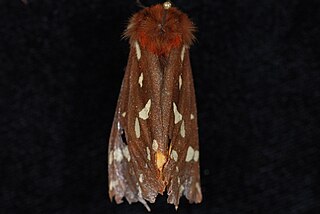
Platarctia is a genus of tiger moths in the family Erebidae described by Packard in 1864.
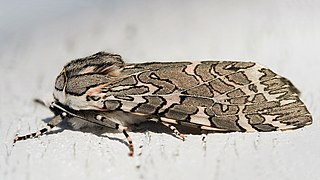
Arachnis picta, the painted tiger moth, is a moth of the family Erebidae. The species was first described by Alpheus Spring Packard in 1864. It is found in the Southwestern United States and the bordering parts of Mexico.

Lophocampa argentata, the silver-spotted tiger moth, is a species of moth in the family Erebidae. It was described by Packard in 1864. It is found from British Columbia to southern California, and east to Arizona, Nevada, New Mexico, Colorado, Utah, Wyoming and possibly to northern Mexico.

Phryganidia californica, the California oakworm or California oak moth, is a moth of the family Notodontidae. The species was first described by Alpheus Spring Packard in 1864. It is found along the coasts of the US states of California and Oregon.

Dasychira basiflava, the yellow-based tussock, is a moth of the family Erebidae. The species was first described by Alpheus Spring Packard in 1865. It is found in North America from Massachusetts and southern Ontario west to Iowa, Texas, south to South Carolina and possibly Florida.

Misogada is a monotypic moth genus of the family Notodontidae erected by Francis Walker in 1865. Its only species, Misogada unicolor, the drab prominent, was first described by Alpheus Spring Packard in 1864. It is found in North America from Nova Scotia to Florida, west to Texas and north to Saskatchewan.
Callosamia is a genus of moths in the family Saturniidae first described by Packard in 1864.
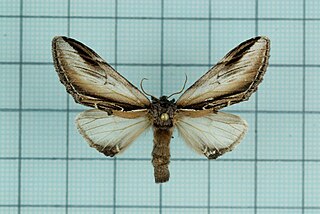
Pheosia rimosa, the black-rimmed prominent moth, fissured prominent or false-sphinx, is a moth of the family Notodontidae. The species was first described by Alpheus Spring Packard in 1864. It is found from coast to coast in North America, although it is less common in the south-eastern United States.
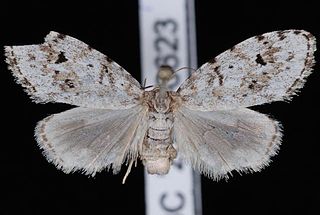
Clemensia albata, the little white lichen moth, is a moth of the family Erebidae. It was described by Alpheus Spring Packard in 1864. It is found in eastern North America, west across boreal Canada to south-eastern British Columbia. The range extends along the Pacific Coast south to Monterey Bay in west-central California. The habitat consists of moist forests, including coastal rainforests, oak woodlands and mixed hardwood forests.
Lycomorpha grotei, or Grote's lycomorpha moth, is a moth of the family Erebidae. It was described by Alpheus Spring Packard in 1864. It is found in North America, including Arizona, California, Colorado, Montana, Nevada, South Dakota, Texas, Utah and Wyoming.

Pseudohemihyalea edwardsii, or Edwards' glassy-wing, is a moth in the family Erebidae. It was described by Alpheus Spring Packard in 1864. It is found in the United States from western Oregon and the Columbia Gorge in southern Washington south to California, in the south-west east to western New Mexico. The habitat consists of oak woodlands and mixed hardwood forests at low elevations.
Pyrrharctia genini is a moth in the family Erebidae. It was described by Hubert Robert Debauche in 1938. It is found in Mexico.
Packardia elegans, the elegant tailed slug moth, is a species of moth in the family Limacodidae. It is found in Canada and the United States, where it has been recorded from woodlands and forests, ranging from north-eastern Missouri to Quebec and Maine, south to north-eastern Georgia.














